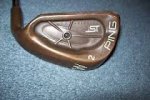- Joined
- Jun 10, 2003
- Messages
- 15,288
https://www.sciencedaily.com/releases/2017/09/170901113607.htm
Interesting history of metallurgy . Is anyone making copper knives ?
Interesting history of metallurgy . Is anyone making copper knives ?



